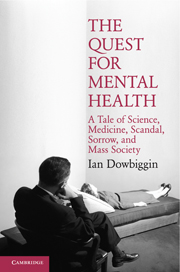1 - A New Egalitarianism
Published online by Cambridge University Press: 05 June 2012
Summary
The late eighteenth century was a time of vast changes throughout the Western world, so it was no coincidence that the modern quest for mental health began in the same era. As political revolutions wracked governments on both sides of the Atlantic Ocean, as the industrial revolution spread throughout Europe, and as an unprecedented wave of sentiment for reform swept through England, western Europe, and North America, approaches and attitudes toward mental health were also in flux.
The origins of these shifts in mental health care sometimes pre-dated the late eighteenth century. Yet it is equally true that what emerged from the turmoil and ferment of the years between the American Revolution and the death of Napoleon was so different from what had gone before that contemporaries in the nineteenth century readily acknowledged that a major watershed in the history of mental health care had occurred. A new idea was born: that psychological well-being was not just an aim whose realization governments and their citizens increasingly desired, but – thanks to the march of science, the expansion of expert knowledge, and the right level of state support – an achievable and laudable goal. By the mid–nineteenth century, more and more people within industrializing societies had concluded that mental disabilities could best be treated in an institutional setting under the watchful eyes of licensed physicians. But in the meantime a new understanding of what it means to be emotionally unwell began to emerge.
- Type
- Chapter
- Information
- The Quest for Mental HealthA Tale of Science, Medicine, Scandal, Sorrow, and Mass Society, pp. 8 - 36Publisher: Cambridge University PressPrint publication year: 2011

